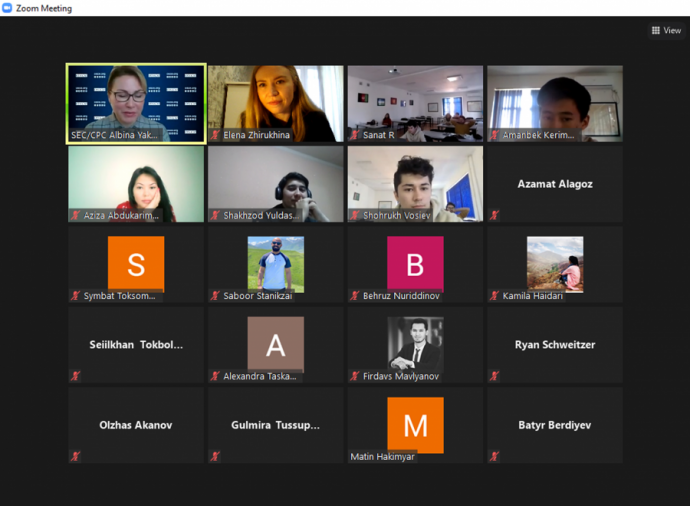News
Project Officer of the Conflict Prevention Centre of the OSCE discussed the Cross-Border Travel of Foreign Terrorist Fighters with Students
On April 2 Ms. Albina Yakubova, Project Officer at the Conflict Prevention Centre of the Organization for Security and Co-operation in Europe (OSCE), e-visited the OSCE Academy in Bishkek to deliver the online lecture on the role of the OSCE’s Transnational Threats Department (TNTD) in addressing cross-border travel of foreign terrorist fighters (FTFs). During her career, Ms. Albina Yakubova contributed to the implementation of UNODC’s various technical assistance projects on precursors control, crime and terrorism prevention and also worked as a Programme Management Officer of Border Security and Management Unit at the OSCE’s TNTD for the past eight years. This lecture was a part of the course ‘Contemporary Security Issues’ taught by Dr. Elena Zhirukhina within MA Programme in Politics and Security.
In her lecture, Ms. Yakubova underlined multiple challenges in border security and management that include irregular migration, corruption, disrupted borders, trafficking in illicit drugs and precursors, in human beings, in cultural property, and in weapons, as well as cross-border travel of foreign terrorist fighters. The latter challenge has manifested itself in recent years. Indeed, according to the United Nations (UN) estimates, over 40000 FTFs travelled to Iraq and Syria from over 100 countries since 2014. Severity of the threat emanating from FTFs travel is recognised by the number of legally binding UN Security Council Resolutions, foremost, 2178 (2014) and 2396 (2017) as well as associated politically binding OSCE’s Ministerial Council Declarations and Decisions.
Ms. Yakubova further noted that complex tasks faced by border officers range from risk assessment of large passengers’ flow by limited personnel with limited resources to developing risk indicators helpful in identifying individuals of interest. Ms. Yakubova exemplified these challenges by saying that, for instance, according to FRONTEX an average calculated time to process one passenger would fall within the range of 17 to 22 seconds. That includes evaluating authenticity of travel documents but also checking a passenger against existing watchlists. As there is no single profile of a terrorist, assessing risk factors, behavioural analysis, applicable to an individual and his or her travel is also a job of a border officer. To fully understand the complexity of border security and management, it is useful to remember that no border is the same, thus, every border requires specific handling respective to its localities. To support OSCE participating States, TNTD established and trained the OSCE Mobile Training Team (MTT) on the identification of potential FTFs at the borders. The MTT is comprising of operational border officers and counter-terrorism experts who deliver training in the selected border checkpoints with support of the OSCE and other international experts.
Therefore, strengthening the capacity of border services, advancing technological capacity, as well as ensuring international co-operation and information sharing play a key role in preventing movements of foreign terrorist fighters, stressed Ms. Yakubova. To support participating States in keeping their borders secure and open, the OSCE implements technical assistance in strengthening border control capacity, enhancing the use of Advance Passenger Information (API) system and increasing the use of INTERPOL databases. For instance, API captures passport data of passengers and provides basic flight details prior to departure allowing states to check the data against databases and watchlists and pre-identify in advance passengers entering their borders, elaborated Ms. Yakubova. She further explained that the states are now legally obliged to establish API system. To that end, the OSCE in partnership with other international stakeholders assists OSCE participating States and Partners for Co-operation in developing national Roadmaps for the establishment and use of API including by providing subject-matter expertise on legal and technical issues and by training personnel of national border services.
For more information about the OSCE activities in border management please visit online resources of the Border Security and Management Unit, Transnational Threats Department, the OSCE Secretariat (can be found here: https://www.osce.org/secretariat/borders)
As a follow up on her lecture and acting in her current role, Ms. Albina Yakubova kindly shared with students two upcoming opportunities with the OSCE on confidence- and security building measures (CSBMs), arms control, disarmament, and non-proliferation that can be found below:
1. You are kindly invited to take part in the second edition of the OSCE-IFSH Essay Competition on conventional arms control and CSBMs for young professionals. This is not only an opportunity to present your research to diplomats in Vienna but also an occasion to win up to EUR 3.000. Please find the details here.
2. In addition, we are glad to announce that the call for applications for the 4th edition of the OSCE-UNODA Scholarship for Peace and Security training programme on arms control, disarmament and non-proliferation is out.



 Русская версия
Русская версия